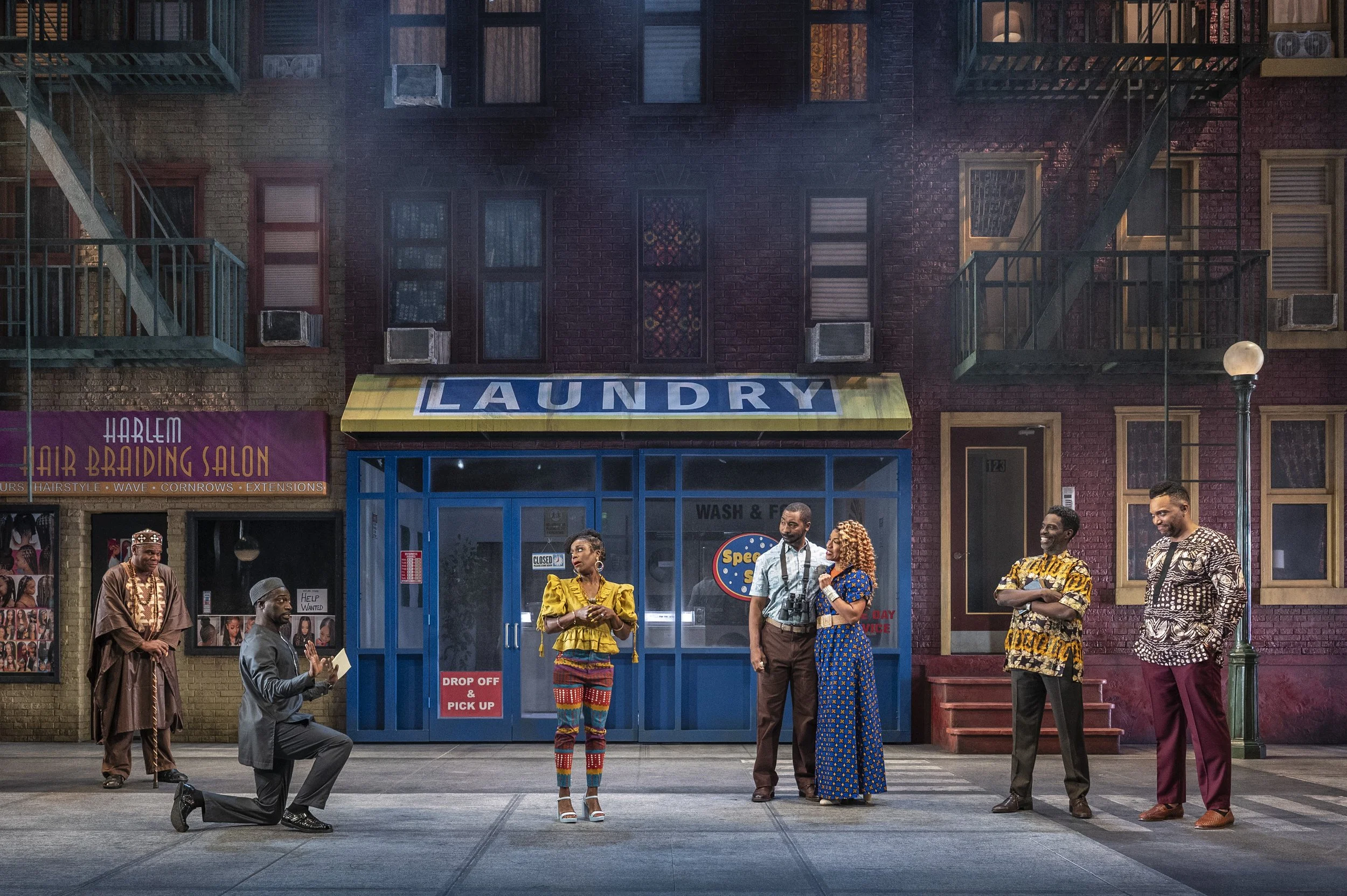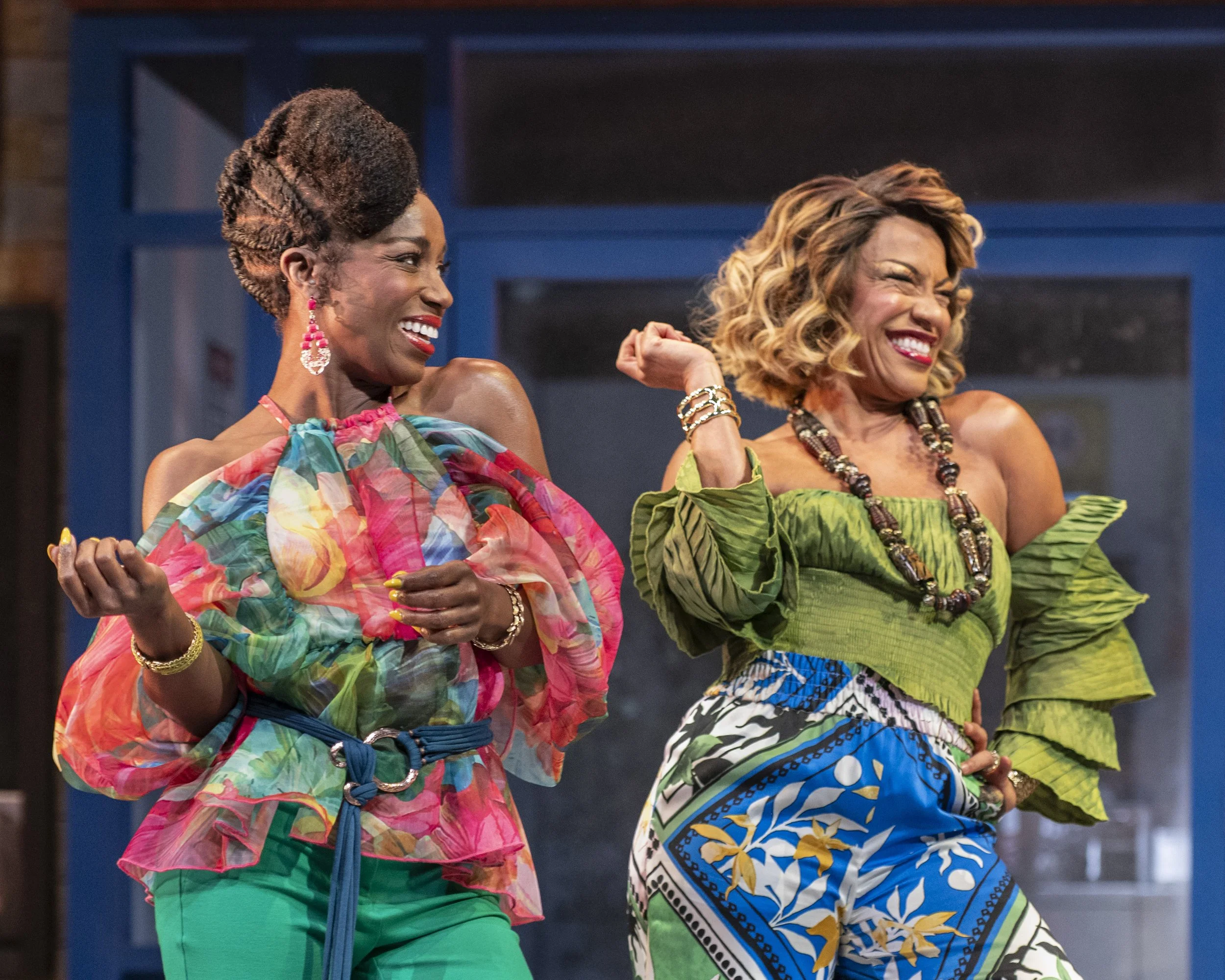New production brims with community and joy
[The cast of Merry Wives at Shakespeare Theatre Company. Photo by Teresa Castracane Photography.]
A review of Merry Wives at The Shakespeare Theatre
by Norah Vawter
Merry Wives—playing through October 5 at the Shakespeare Theatre in Washington, D.C.—is colorful, delightful, and teeming with joy from beginning to end. This reimagining of William Shakespeare’s classic comedy Merry Wives of Windsor features an all-Black cast and relocates the story from 1590s Windsor, England to the 116th Street neighborhood of present-day South Harlem. Notably the crew is also quite diverse, and both the adapter and director of Merry Wives are Black women. This new adaptation by Jocelyn Bioh is a fascinating piece of theater because of the way it weaves together the old and the new.
It's increasingly common to stage Shakespeare’s plays with modern settings, but usually these changes are more akin to window dressings. Bioh and Director Taylor Reynolds have done something more substantial here. While retaining most of Shakespeare’s language, and faithfully telling the play’s original story, the adaptation adds a smattering of modern words and updates that ground the story in its new setting, emphasizing the diverse, multicultural, urban community portrayed—and sometimes directly addressing its modern audience. The effect is a show that feels new and distinct, both Shakespeare and not Shakespeare.
[Felicia Curry and Oneika Phillips in Merry Wives at Shakespeare Theatre Company. Photo by Teresa Castracane Photography.]
Bioh’s adaptation, commissioned in 2020 during the height of the pandemic and the Black Lives Matter protests, was first performed in New York in 2021 by Central Park’s Delacorte Theater. But I think the diverse representation—and the implicit message that Shakespeare today should be inclusive of all races and ethnicities—is even more relevant and important in 2025. As the Trump administration, and the conservative movement at-large, wage war on diversity, equity, and inclusion, we need more productions like Merry Wives reminding us that our storytelling should reflect the whole world. Calling attention to the diversity of the African Diaspora, this Merry Wives is set in the largely-immigrant community of South Harlem’s 116th Street neighborhood with characters from many different ethnicities including Nigerian, Ghanaian, Senegalese, Liberian, and Black American individuals. The play also includes motifs of West African mythology and folk festivals.
However, this show is much more than a political statement. The play begins and ends with music and dancing, and what makes the production feel special and particularly successful is the smorgasbord of sights and sounds and sensory delights. The spectacle! Which is fitting, because the story of The Merry Wives of Windsor has always centered spectacle and trickery. It’s a story about characters fooling each other, meddling in each other’s lives, and deceiving each other into believing various schemes. In this updated production Mikaal Sulaiman’s music and sound design works seamlessly with Ashleigh King’s choreography, and Jeannette Oi-Suk Yew’s lighting design to create an audio-visual show that is unified, fluid, rhythmic, and rich.
[Felicia Curry, Jordan Barbour, Nick Rashad Burroughs, Sekou Laidlow, and JaBen Early in Merry Wives at Shakespeare Theatre Company. Photo by Teresa Castracane Photography.]
Scenic design by Lawrence E. Moten III is particularly inspired. Some sets rise up through the floor, descend from above, or are pulled out from behind the stage, creating a sense of constant movement, transformation, and hidden stories waiting to be told. The city is teeming with life, and it feels like the play is reminding us that there is so much more happening than we see from the outside.
This is an incredibly fun production to experience, and on opening night the audience’s enjoyment was palpable throughout the theater. Speaking about how important it is to represent Black joy on stage and what that means to her, Reynolds has said, “It means getting to see [Black characters], and their primary emotion is not fear or shame or rage. And Black joy, to me, also encompasses movement, music, color, vibrancy. I think that there is a resilience that is really beautiful in Black joy. And if I am in my seat as an audience member moving and grooving and feeling a direct connection with the performers on stage, even if they are in a moment of strife, that to me is still Black joy.”
[Jacob Ming-Trent in Merry Wives at Shakespeare Theatre Company. Photo by Teresa Castracane Photography.]
As in the original, Merry Wives focuses on John Falstaff (Jacob Ming-Trent), who is no longer a knight but still the scheming trickster of the neighborhood. Falstaff has concocted a scheme to get rich by seducing two wealthy women, Madam Nkechi Ford (Felicia Curry) and Madame Ekua Page (Oneika Phillips). But the two women catch on almost immediately and get the upper hand by pranking and scheming much more effectively. There are a number of other schemes going on concurrently—including Madam and Mister Page (JaBen Early) trying to marry their daughter Anna (Peyton Rowe) off to different suitors. In fact, everyone in the neighborhood seems to be meddling in someone’s else’s business or being meddled with.
Classic Shakespearean tropes like disguises, mistaken identities, messengers, and misunderstandings are employed, and hilarity and silliness ensue. The Merry Wives of Windsor is a farce without the depth of some of Shakespeare’s more often-produced comedies, but there is a lot being said here about marriage and gender politics. Curry and Phillips do an excellent job portraying women who are strong, smart, and at the same time petty and ridiculous.
[The cast of Merry Wives at Shakespeare Theatre Company. Photo by Teresa Castracane Photography.]
Ming-Trent, Curry, and Phillips anchor an overall strong ensemble cast, though I will say that they outshine the younger actors. I failed to find the subplot about Anna and her suitors nearly as interesting as the main action of Falstaff’s trickery and the merry wives’ revenge. I did enjoy the twist that Anna’s true love Fenton (Latoya Edwards) is played by a woman, which delivers a queer love story without ever discussing gender or sexuality. Regardless of any small pitfalls, this is a stand-out ensemble that shines because the actors truly work together. There’s a lived-in feeling to this fictional community, a sense that these people know each other well and have a long history of being intertwined in each other’s lives. There’s also a real sense of authenticity and specificity to the portrayal of Harlem, and much credit goes to Ivania Stack’s colorful, playful costume design, Nikiya Mathis’ wig and hair design, and Dawn-Elin Fraser’s voice and dialect coaching.
Ultimately Merry Wives is a vibrant, fun show that doesn’t take itself too seriously. What it does take seriously is joy. This new adaptation is so full of merriment, it’s almost giddy with joy. Sitting in the audience, surrounded by laughter and good vibes, I felt like we were all in this together. If there’s a point to be found within the schemes, hijinks, and shenanigans of Shakespeare and Bioh’s merry farce, I think it’s to remind us of the importance of joy, laughter, and community. These days, we can all use that reminder.
Merry Wives runs through October 5, 2025 at The Shakespeare Theatre’s Harman Hall, located at 610 F Street NW, Washington, DC 20004. Runtime is approximately one hour and 50 minutes, with no intermission. Tickets can be purchased by calling the Box Office at (202) 547-1122 or online.
Norah Vawter is the co-founder and fiction/nonfiction editor of Washington Unbound. She’s a freelance writer, editor, and novelist, represented by Alisha West of Corvisiero Agency. Follow her on Instagram @norahvawter and check out her Substack, Survival by Words.





